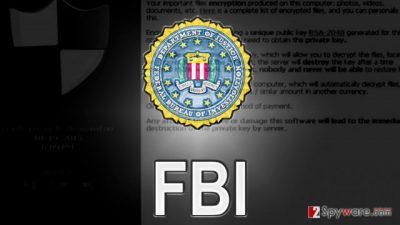FBI encourages ransomware victims not to pay the ransom
In a recently released announcement, FBI warns of rise in ransomware attacks on computer users and shares tips on dealing with these computer viruses. It is no surprise that Federal Bureau of Investigations shares such information, because the number of ransomware attacks has increased terrifically. Cyber criminals started to create them one after another since 2015, and the number of ransomware variants continues to grow in 2016. This type of computer malware targets hospitals, both small and large businesses, schools, governments, as well as home computers. It encrypts all files on an infected computer or an entire network of them, and then demands a ransom in exchange for a decryption software.
Cyber criminals have developed advanced techniques to break into victims’ computers silently. Usually, they send executive ransomware files for victims’ via email, claiming to be delivering some important documents or archives. When the victim opens such malicious email attachment, the virus corrupts all files on the computer. What is more, crooks have become so skillful that they can insert malicious codes into legitimate websites behind any clickable content, buttons, links or ads. It goes without saying that taking precautions and securing your computer and your files in advance is a matter of an utmost importance nowadays. You should be especially careful with TeslaCrypt, Cerber (Mac ransomware), Cryptolocker and Locky.

There is no doubt that losing important files is a tragic experience. However, FBI claims that ransomware victims should not pay the ransom that cyber criminals demand. The FBI Cyber Division Assistant Director James Trainor affirms that paying the ransom does not guarantee that cyber criminals will provide decryption keys or programs and that it only encourages frauds to continue their illegal activities and also involve more people into this dirty business. The profit that ransomware threats generate for cyber criminals is beyond comprehension, and we only can wonder what other illegal activities frauds fund with money that ransomware victims pay.
FBI recommends taking precautions to prevent ransomware attacks. Here’s what you can do to secure your files:
- Inform your employees about ransomware viruses and make sure they are aware of methods how to prevent ransomware attacks.
- Install anti-malware software on the computers you or your employees use. Schedule regular automatic system scans.
- Disable Macros function in Microsoft Office apps.
- Update computer software regularly.
- Avoid using administrator accounts, unless you absolutely need to.
- Back up the most important data regularly. Ideally, store backups on external drives and unplug them from the computer.

